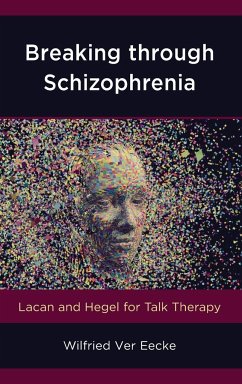- Gebundenes Buch
- Merkliste
- Auf die Merkliste
- Bewerten Bewerten
- Teilen
- Produkt teilen
- Produkterinnerung
- Produkterinnerung
Through a collection of published and unpublished articles, Ver Eecke traces the path of Lacanian thought. He discusses the importance of language for the development of human beings and examines the effectiveness of talk therapy through case studies with schizophrenic persons.
Andere Kunden interessierten sich auch für
![Breaking through Schizophrenia Breaking through Schizophrenia]() Wilfried Ver EeckeBreaking through Schizophrenia81,99 €
Wilfried Ver EeckeBreaking through Schizophrenia81,99 €![Breaking Through Executive Dysfunction Breaking Through Executive Dysfunction]() Andrew D BeattieBreaking Through Executive Dysfunction12,99 €
Andrew D BeattieBreaking Through Executive Dysfunction12,99 €![Breaking Free from Anxiety Breaking Free from Anxiety]() Michelle MannBreaking Free from Anxiety18,99 €
Michelle MannBreaking Free from Anxiety18,99 €![Breaking Through Betrayal Breaking Through Betrayal]() Holli KenleyBreaking Through Betrayal30,99 €
Holli KenleyBreaking Through Betrayal30,99 €![Breaking the Chains Breaking the Chains]() Kenneth CaraballoBreaking the Chains30,99 €
Kenneth CaraballoBreaking the Chains30,99 €![Breaking Through Betrayal Breaking Through Betrayal]() Holli KenleyBreaking Through Betrayal20,99 €
Holli KenleyBreaking Through Betrayal20,99 €![Breaking the Barrier Breaking the Barrier]() Jules HawthorneBreaking the Barrier13,99 €
Jules HawthorneBreaking the Barrier13,99 €-
-
-
Through a collection of published and unpublished articles, Ver Eecke traces the path of Lacanian thought. He discusses the importance of language for the development of human beings and examines the effectiveness of talk therapy through case studies with schizophrenic persons.
Hinweis: Dieser Artikel kann nur an eine deutsche Lieferadresse ausgeliefert werden.
Hinweis: Dieser Artikel kann nur an eine deutsche Lieferadresse ausgeliefert werden.
Produktdetails
- Produktdetails
- Verlag: Rowman & Littlefield Publishers
- Seitenzahl: 298
- Erscheinungstermin: 1. Mai 2019
- Englisch
- Abmessung: 235mm x 157mm x 22mm
- Gewicht: 637g
- ISBN-13: 9781538118009
- ISBN-10: 1538118009
- Artikelnr.: 54813335
- Herstellerkennzeichnung
- Libri GmbH
- Europaallee 1
- 36244 Bad Hersfeld
- gpsr@libri.de
- Verlag: Rowman & Littlefield Publishers
- Seitenzahl: 298
- Erscheinungstermin: 1. Mai 2019
- Englisch
- Abmessung: 235mm x 157mm x 22mm
- Gewicht: 637g
- ISBN-13: 9781538118009
- ISBN-10: 1538118009
- Artikelnr.: 54813335
- Herstellerkennzeichnung
- Libri GmbH
- Europaallee 1
- 36244 Bad Hersfeld
- gpsr@libri.de
Wilfried Ver Eecke, PhD. is a licensed professional counselor and a professor of Philosophy at George Washington University. Ver Eecke studied psychoanalysis in Paris under Jacques Lacan, Piera Aulagnier, Octave Mannoni, and André Green. He co-founded the Lacan Forum of Washington, and gives frequent talks nationally and internationally on psychoanalytic topics often connected with philosophical ideas. He is the author of numerous articles and books on psychoanalytic topics.
Foreword by Bertram P. Karon, PhD, ABPP Introduction Part I: Psycho-Social
and Linguistic Complexity of Human Beings as a Basis to Understand
Schizophrenia and Psychosis Chapter 1: Towards a Philosophy of Psychosis
Chapter 2: The Subjective Experience of the Person with Schizophrenia
Chapter 3: Philosophical Questions about the Theory of Psychosis in the
Early Lacan Chapter 4: Paternal Metaphor and Ordinary Psychosis Chapter 5:
Theoretical and Therapeutic Implications of the Later Lacan's Complex
Theory of Psychosis Chapter 6: A Post-Lacanian View on Schizophrenia Part
II: Hegel and Lacan on Mental Illness Chapter 7: Hegel as Lacan's Source
for Necessity in Psychoanalytic Theory Chapter 8: Hegel and Lacan on
Paranoia and the Question of How to Avoid the Dangers Inherent in Ideas of
Social Reform Part III: Psychosis and Schizophrenia are Illnesses Marked by
a Defective Relationships to Language Chapter 9: Phenomenology, Linguistic
Intentionality, Affectivity and Villemoes' New Therapy for Schizophrenics
Chapter 10: Self-referencing in the Language of the Severely Mentally Ill
Part IV: Lacan's Concept of "Paternal Metaphor" Applied to Schreber and
Hölderlin Chapter 11: Reflections on the Concept of "Paternal Metaphor" at
the Occasion of Lacan's and Schatzman's analyses of Schreber Chapter 12:
The Concept of "A-Father" or the Psychological Origin of Mental Breakdown
in Schreber and Hölderlin Part V: Lacanian Reflections on Successful Talk
Therapies with Persons Afflicted with Schizophrenia or Psychosis. Chapter
13: A Lacanian Interpretation of Karon's Psychoanalytic Treatment of
Persons Afflicted with Schizophrenia Chapter 14: On Villemoes' Lacanian
Inspired Treatment Method of Persons Afflicted with Schizophrenia Chapter
15: On Prouty's Successful Treatment Method for Persons Afflicted with
Schizophrenia Conclusion
and Linguistic Complexity of Human Beings as a Basis to Understand
Schizophrenia and Psychosis Chapter 1: Towards a Philosophy of Psychosis
Chapter 2: The Subjective Experience of the Person with Schizophrenia
Chapter 3: Philosophical Questions about the Theory of Psychosis in the
Early Lacan Chapter 4: Paternal Metaphor and Ordinary Psychosis Chapter 5:
Theoretical and Therapeutic Implications of the Later Lacan's Complex
Theory of Psychosis Chapter 6: A Post-Lacanian View on Schizophrenia Part
II: Hegel and Lacan on Mental Illness Chapter 7: Hegel as Lacan's Source
for Necessity in Psychoanalytic Theory Chapter 8: Hegel and Lacan on
Paranoia and the Question of How to Avoid the Dangers Inherent in Ideas of
Social Reform Part III: Psychosis and Schizophrenia are Illnesses Marked by
a Defective Relationships to Language Chapter 9: Phenomenology, Linguistic
Intentionality, Affectivity and Villemoes' New Therapy for Schizophrenics
Chapter 10: Self-referencing in the Language of the Severely Mentally Ill
Part IV: Lacan's Concept of "Paternal Metaphor" Applied to Schreber and
Hölderlin Chapter 11: Reflections on the Concept of "Paternal Metaphor" at
the Occasion of Lacan's and Schatzman's analyses of Schreber Chapter 12:
The Concept of "A-Father" or the Psychological Origin of Mental Breakdown
in Schreber and Hölderlin Part V: Lacanian Reflections on Successful Talk
Therapies with Persons Afflicted with Schizophrenia or Psychosis. Chapter
13: A Lacanian Interpretation of Karon's Psychoanalytic Treatment of
Persons Afflicted with Schizophrenia Chapter 14: On Villemoes' Lacanian
Inspired Treatment Method of Persons Afflicted with Schizophrenia Chapter
15: On Prouty's Successful Treatment Method for Persons Afflicted with
Schizophrenia Conclusion
Foreword by Bertram P. Karon, PhD, ABPP Introduction Part I: Psycho-Social
and Linguistic Complexity of Human Beings as a Basis to Understand
Schizophrenia and Psychosis Chapter 1: Towards a Philosophy of Psychosis
Chapter 2: The Subjective Experience of the Person with Schizophrenia
Chapter 3: Philosophical Questions about the Theory of Psychosis in the
Early Lacan Chapter 4: Paternal Metaphor and Ordinary Psychosis Chapter 5:
Theoretical and Therapeutic Implications of the Later Lacan's Complex
Theory of Psychosis Chapter 6: A Post-Lacanian View on Schizophrenia Part
II: Hegel and Lacan on Mental Illness Chapter 7: Hegel as Lacan's Source
for Necessity in Psychoanalytic Theory Chapter 8: Hegel and Lacan on
Paranoia and the Question of How to Avoid the Dangers Inherent in Ideas of
Social Reform Part III: Psychosis and Schizophrenia are Illnesses Marked by
a Defective Relationships to Language Chapter 9: Phenomenology, Linguistic
Intentionality, Affectivity and Villemoes' New Therapy for Schizophrenics
Chapter 10: Self-referencing in the Language of the Severely Mentally Ill
Part IV: Lacan's Concept of "Paternal Metaphor" Applied to Schreber and
Hölderlin Chapter 11: Reflections on the Concept of "Paternal Metaphor" at
the Occasion of Lacan's and Schatzman's analyses of Schreber Chapter 12:
The Concept of "A-Father" or the Psychological Origin of Mental Breakdown
in Schreber and Hölderlin Part V: Lacanian Reflections on Successful Talk
Therapies with Persons Afflicted with Schizophrenia or Psychosis. Chapter
13: A Lacanian Interpretation of Karon's Psychoanalytic Treatment of
Persons Afflicted with Schizophrenia Chapter 14: On Villemoes' Lacanian
Inspired Treatment Method of Persons Afflicted with Schizophrenia Chapter
15: On Prouty's Successful Treatment Method for Persons Afflicted with
Schizophrenia Conclusion
and Linguistic Complexity of Human Beings as a Basis to Understand
Schizophrenia and Psychosis Chapter 1: Towards a Philosophy of Psychosis
Chapter 2: The Subjective Experience of the Person with Schizophrenia
Chapter 3: Philosophical Questions about the Theory of Psychosis in the
Early Lacan Chapter 4: Paternal Metaphor and Ordinary Psychosis Chapter 5:
Theoretical and Therapeutic Implications of the Later Lacan's Complex
Theory of Psychosis Chapter 6: A Post-Lacanian View on Schizophrenia Part
II: Hegel and Lacan on Mental Illness Chapter 7: Hegel as Lacan's Source
for Necessity in Psychoanalytic Theory Chapter 8: Hegel and Lacan on
Paranoia and the Question of How to Avoid the Dangers Inherent in Ideas of
Social Reform Part III: Psychosis and Schizophrenia are Illnesses Marked by
a Defective Relationships to Language Chapter 9: Phenomenology, Linguistic
Intentionality, Affectivity and Villemoes' New Therapy for Schizophrenics
Chapter 10: Self-referencing in the Language of the Severely Mentally Ill
Part IV: Lacan's Concept of "Paternal Metaphor" Applied to Schreber and
Hölderlin Chapter 11: Reflections on the Concept of "Paternal Metaphor" at
the Occasion of Lacan's and Schatzman's analyses of Schreber Chapter 12:
The Concept of "A-Father" or the Psychological Origin of Mental Breakdown
in Schreber and Hölderlin Part V: Lacanian Reflections on Successful Talk
Therapies with Persons Afflicted with Schizophrenia or Psychosis. Chapter
13: A Lacanian Interpretation of Karon's Psychoanalytic Treatment of
Persons Afflicted with Schizophrenia Chapter 14: On Villemoes' Lacanian
Inspired Treatment Method of Persons Afflicted with Schizophrenia Chapter
15: On Prouty's Successful Treatment Method for Persons Afflicted with
Schizophrenia Conclusion








